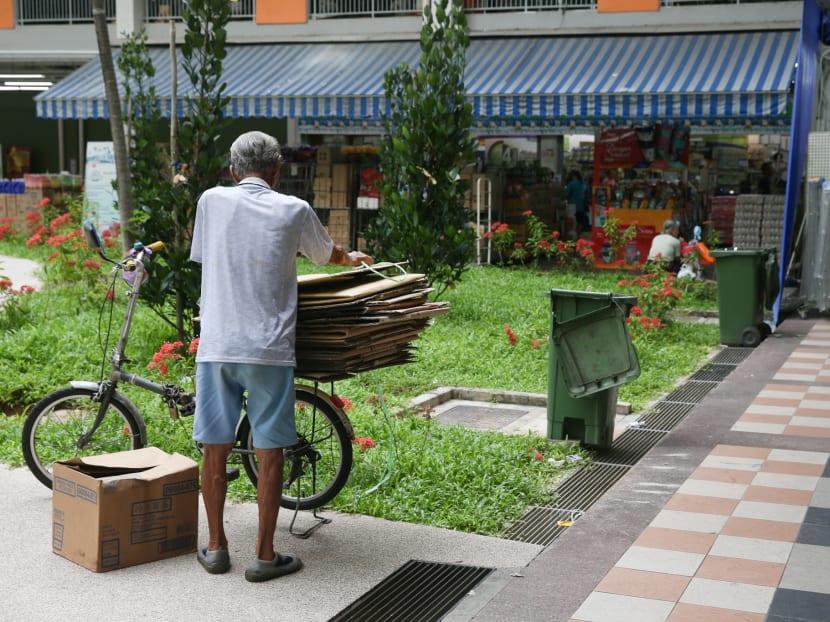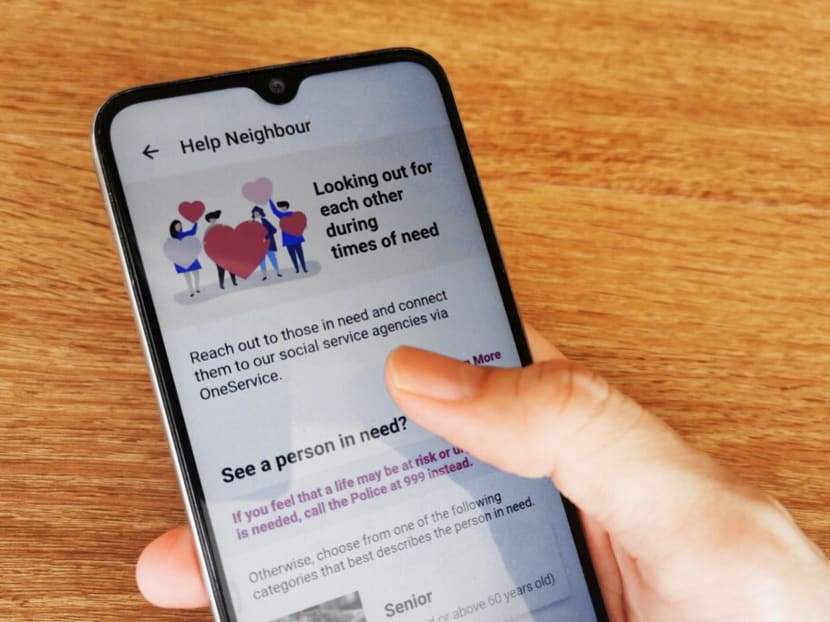‘Help Neighbour’ app feature lets residents alert agencies to needy, rather than do so via social media
SINGAPORE — A new “Help Neighbour” feature was launched on Thursday (Sept 2) to make it easier for residents to alert social service agencies to people in need, so that they may get the help they need quickly.

Residents often alert social service agencies to four groups of people in need: Vulnerable seniors, rough sleepers, cardboard collectors and tissue-paper sellers.
- A new feature in the OneService app allows residents to alert social service agencies to vulnerable residents in their neighbourhoods
- Four groups often reported by residents are vulnerable seniors, rough sleepers, cardboard collectors and tissue-paper sellers
- With this, residents will not have to call attention to the needy through social media and risk their overexposure
- Since the feature’s soft launch in late June, there have been 58 cases of feedback, 40 per cent of which were new to agencies
SINGAPORE — A new “Help Neighbour” feature was launched on Thursday (Sept 2) to make it easier for residents to alert social service agencies to people in need, so that they may get the help they need quickly.
Instead of having to remember which agency to contact or call attention to these people on social media, residents who wish to direct them to social service agencies may do so via the feature, which is part of the OneService mobile application by the Municipal Services Office (MSO).
The feedback will allow the Agency for Integrated Care (AIC), the Ministry of Social and Family Development (MSF) and their partners to get in touch speedily through the use of geotagged data, AIC, MSF and MSO said in a statement.
For a start, the agencies said that they were focusing on four groups of people commonly flagged up by “well-meaning” neighbours: Vulnerable seniors, rough sleepers, cardboard collectors and tissue sellers who may be in need.
There is also an “Others” category that allows residents to flag those who do not belong in the four groups.
Although the feature was announced only on Thursday, it had been running for more than a month — since June 30 — in the app.
By last month, residents submitted 58 pieces of feedback, with about 60 per cent of the referrals already known to the agencies.
In a Facebook post, Ms Sim Ann, Senior Minister of State for Foreign Affairs and National Development, said that the outcome was that 40 per cent were new cases that were brought to the agencies’ attention.
She wrote about an encounter with one of her elderly and needy residents, who had repeatedly turned down help from the agencies.
However, a “caring stranger” later made a social media post of the woman appearing lost and hungry, and accepting food from strangers. The post alerted the agencies to her declining health and independence.
This led to a lengthy exercise involving many agencies, social workers and volunteers persuading her to accept help and medical attention, talking to her family members and working out a long-term care plan.
Ms Sim, a Member of Parliament for the Holland-Bukit Timah Group Representation Constituency, said that the woman was eventually admitted to a nursing home where she would receive proper care.
Ms Sim wrote: “If there was a simple way for social agencies to be directly notified, that would be even better.”

Instead of running the risk of “overexposing” a vulnerable person in a social media post, the Help Neighbour feature allows concerned strangers to report their encounters directly to social service agencies, Ms Sim said.
“This is especially relevant because some cases involve complicated family dynamics and public exposure can mean greater pressure on already-strained family relations.
“And while the concerned stranger submitting the feedback may not be told confidential details, he or she will be assured that the person is being helped — which I believe is the core motivation why people make such social media postings in the first place.”
AIC, MSF and MSO said that the new feature complemented existing feedback channels, such as the Vulnerable-in-Community Network and the Partners Engaging and Empowering Rough Sleepers Network, to look out with the community’s help for those in need.
They said, however, that cases related to injury, harm or lives at risk should first be directed to emergency services such as the police.
“Residents are encouraged to engage the person perceived to be in need first, when it is deemed safe and respectful to the person’s privacy, to better understand his or her needs and if assistance is indeed required,” they said.
“This would allow agencies to provide quicker and more targeted help.”











